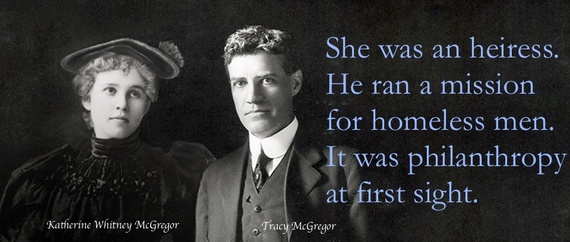This is my brief account of how romance brought together two of Michigan's pioneering philanthropists - Katherine Whitney McGregor and her husband Tracy.
In the 1880s, Tracy McGregor was still in high school when he helped his parents found a homeless shelter in Toledo, Ohio. His father died a few years later -- only weeks after opening another mission - this one, to serve the homeless and the needy in downtown Detroit. Tracy felt he had no choice but to leave his studies at Oberlin College and take over the Detroit mission.
At age 22, he had found his calling. Over the next 45 years, the McGregor Institute would provide food and lodging for 700,000 men.
Tracy met Katherine Whitney, the daughter of one of Michigan's richest families, while they were both volunteering at the Children's Free Hospital in Detroit. The meeting must have made an impression. For soon after, she also volunteered to sing and play the piano at the evening chapel services of the McGregor homeless mission.
Both Katherine and Tracy loved music. But it was purpose that acted as a prelude to their romantic partnership, according to a 2008 biography written by Phillip P. Mason.
"On one occasion when Tracy commented on Katherine's personal wealth she responded that it was merely "a trust of funds to be used for the benefit and relief of the less fortunate section of mankind." Revealing how much they shared in common, Tracy replied, "It is an inspiration to me how your heart goes out to the unfortunate."
Yet, the romance needed the intervention of an unexpected cupid - Katherine's father - who came bearing donations. Mason picks up the story:
"Although they shared common values, their courtship faced obstacles. McGregor initially would not consider marriage with one of Detroit's wealthiest women because of his modest resources and income. As long as he could not "provide" for her properly, marriage had to be postponed. Katherine, however, was not satisfied and turned to her father [David Whitney, Jr.] for advice. She told him that she was deeply in love with McGregor and wanted to be his wife. Her father, who also held McGregor in high regard, agreed to intercede. He called on McGregor and discussed the future of the mission and McGregor's plans. Whitney's solution was straightforward. He donated an endowment of $25,000 to the mission and gave McGregor a substantial grant of money to travel to Europe to study the problems of the homeless there."On his return from Europe in 1899, Tracy's friendship with Katherine blossomed further, and they made definite plans for marriage..."
They tied the knot in 1901 and "formed a lifelong partnership to aid numerous Detroit charities and families in need of assistance," according to their foundation's website. That foundation, the McGregor Fund, was established in 1925 "to relieve the misfortunes and promote the well-being of mankind."
In the same year, the University of Detroit bestowed an honorary doctorate on Tracy, recognizing his work creating community infrastructure:
"As the guiding force behind the Thursday Group, an informal club of influential businessmen and professionals working behind the scenes to promote reform, he helped spearhead improvement in housing, schools, criminal justice and services for the mentally and physically disabled. In 1917, he helped organize the Detroit Community Union and Patriotic Fund, forerunners of today's United Way for Southeastern Michigan."
The McGregors were hands-on philanthropists. As Mason relates in his book, they researched the charities they supported and gave grants in installments so they could monitor performance. Before making a grant, they visited the charities and reviewed their service plans. And, in the case of an orphanage Katherine established in Highland Park in 1904, they followed their financial commitment with a personal one - showing up regularly to play with the children who lived at the orphanage.
In practice, the McGregor Fund focused its work from the beginning in metropolitan Detroit. The McGregors gave in a variety of program areas, including care for the homeless, education, health care and arts and culture. Tracy McGregor died in 1936, Katherine Whitney McGregor in 1954.
Always private, they often sought anonymity in their philanthropy. But the fund that bears their name continues to honor them and their Detroit-centric approach. The fund has provided more than $200 million in assistance over 90 years of service.
For more about the McGregors see the Fund's history page.

